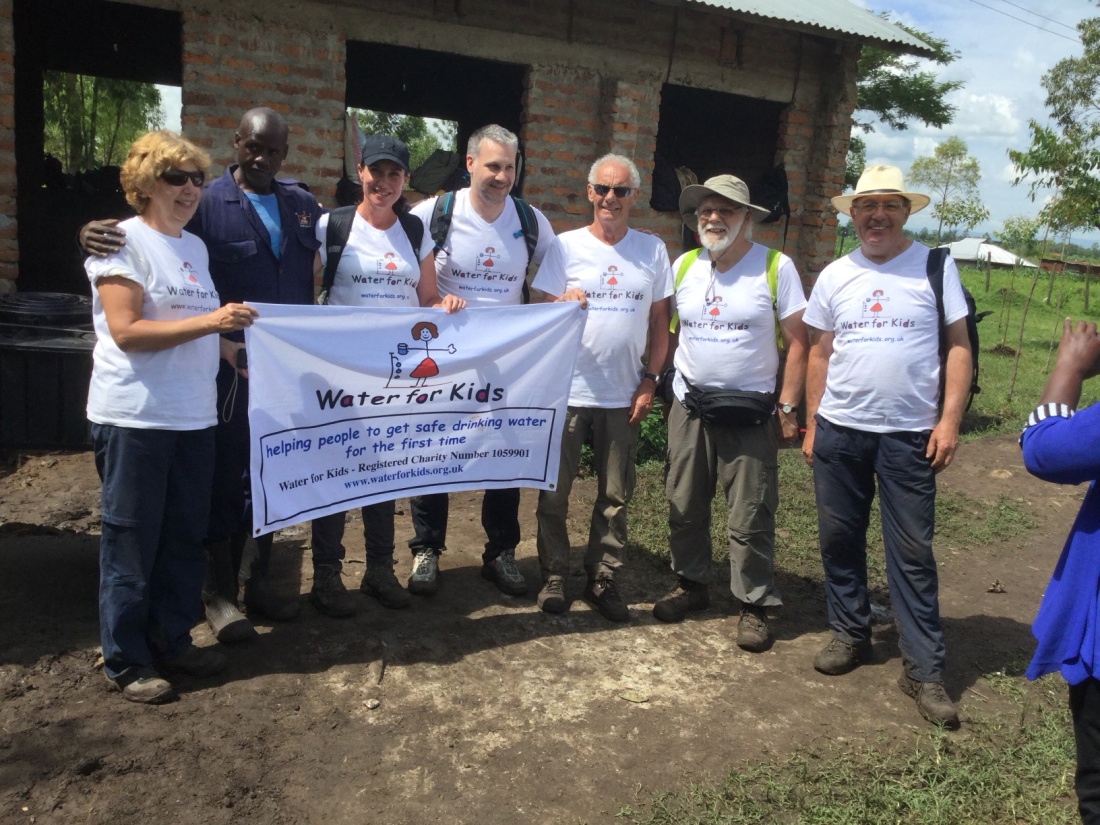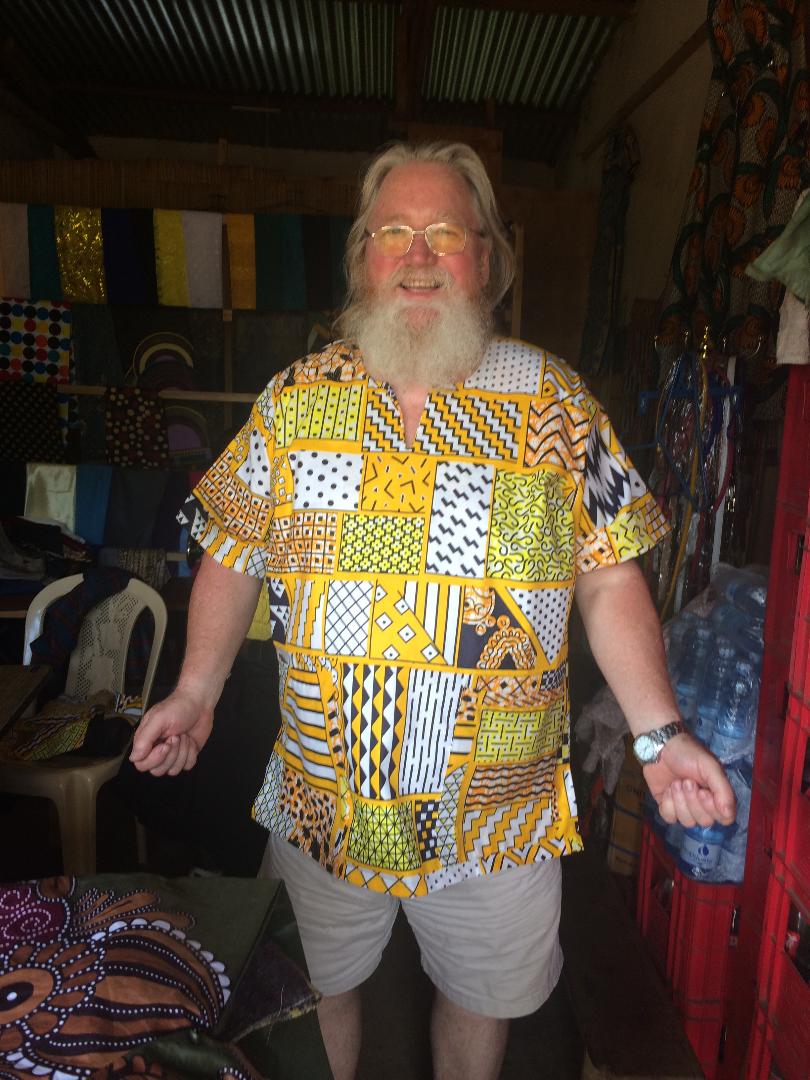25/05/18. Politics, our work here is done
Slept in so no swimming, breakfast, fresh orange and banana, followed by sausage, Spanish omelette, fried sweet potato, potato mixed with peppers and tomatoes, brown bread and spreads. Tim appears to have gained his mastery of the coffee beans, so he is the group barista.
We’re due to meet with chief Cypriani at 10:00, and then move on to speak with education and public health officers. Group assembled we walk down into Ndhiwa arriving at the Chiefs office at 10:05 to find the door locked. Just a few minutes later and the chief walks into the compound, surprisingly in a military style complete with eppelets embroidered, Kenyan Administration. Unlocking his office, we all follow, greetings and introductions made, we sit. Tim starts by describing how our work at the four schools was now complete, but that we had concerns about how the system would no looked after in one location. He asked that the chief try to maintain a watch to see that all the equipment was being correctly used and stored safely. He went on to add that our main concern was at Ndhiwa hospital primary, but softening this with the information that the head, having been spoken to sternly by us after our horror at the uncontrolled use of the tank water. That on our return the following day, there was a great improvement. We just wanted to ensure that the higher standards were maintained.
I pointed out that even with our concerns at this school, we had provided bench seating to the veranda of the new classroom outside of the remit of the project. Other points were raised in discussion with the chief agreeing to keep an eye on the infrastructure we had installed. Our conversation ranged from public health to politics and the unnecessary demise of the Kenyan Acorn Project (KAP), whose nursery and hospital buildings now sat empty and deteriorating. He agreed with our concerns and said he was in the process of appropriating the buildings back for community use and initially at least to reopen the nursery that at one point had an attendance of 100 children. Tom then spoke saying that he had a shopping list from Lucas, a Kenyan who has attempted to keep the nursery going in a church property. Muriel, one of the co founders of KAP had sent across the last £200 from the funds to be spent on equipment to better the education of the children. She had asked that the money be given to the chief (formerly a KAP board member) to ensure it was wisely spent, and asked for a photograph of the handover of the cash. The chief went to his cupboard, emerging with a beret and military swagger stick. Suitably attired he then accepted the cash and had his photograph taken.

We went outside and had a group photograph with the chief, moving then across to the local authority buildings to speak with the public health and education departments, ideally together. The directors were away from the office and we ended up speaking with an asst. public health officer and a clerk from the education team. Barbara spoke of WfK wanting to develop a better working relationship with the two departments as they had in Zambia, Tanzania and Uganda, the officers nodded.she described how this current project, funded by the five volunteers present was completed and that she hoped their departments would work to ensure that the equipment was maintained. The public health officer described how they had extensive hand washing programmes across all 150 schools in the district. A shame that we had found no evidence of this in any of the four schools we had worked with.
He went on to say that his department were well aware of the poorer schools who could benefit from similar interactions. Correspondence address were exchanged as we said we would be interested in a list of the poorest schools, not promising to do anything, but just so if any funding became available in the future, we would know which schools to survey. Our discussion went on to include sanitation and the need particularly to improve the provision for older girls. This something that WfK have had experience of in other countries.
Our discussions ended, visitors books for both departments signed, we headed for the bank. Sam had arranged for a bike for me, so I disappeared off whilst the others started the walk. At the bank, the ATM rejected my card, moving next door to try a teller, I was intercepted by a staff member, who when I explained my problem looked at my Metro Bank card and said it was MasterCard and that they could not deal with this, only Visa. He suggested that I go to HomaBay.
Instead I walked across the road to the dressmakers where I had ordered two African shirts the day before. I recognised the fabric on the machine as the girl looked up and said she was not quite ready. I said no problem and sat down. One of the assistants came out and discarded old charcoal from the iron, replacing with fresh, then stood swinging the iron for 10 minutes waiting for the new charcoal to catch. A few minutes later , with a plastic water bottle, small holes made in the cap squeezes onto a blanket on the counter, she started to iron my 1st shirt. At this point I noticed the remainder of the group emerging from the bank, I said I’d be back and crossed the road to speak with the team. Everyone else had managed to obtain cash, albeit having tried several cards without success first I said I was collecting my shirts and would probably be another 15 minutes, if they wanted to go on I’d catch up.
Decision made to wait, I was followed over the road by Elaine who was looking to purchase some fabric. My first shirt now pressed I tried it on, just taking my existing shirt off, the girls trying to encourage me to the rear of the shop, where a curtain served as a changing area. By now the others had strolled over and commended me on the subtlety of my choice of fabric! Elaine found a length of fabric to suit and made her purchase. My 2nd shirt pressed and tried on, I settled my account K$3600, thanked the young ladies and joined the others roadside where a platoon of bikes were waiting for us.

We were headed up to look at the abandoned KAP project site, part way up to Sangore. No rain for two days now, the streams are no longer running beside the track. Water still lays in the ditches, the deepest ruts in the road still have water, but for the most part, the track surface is baked hard, no longer the sliding around on the mud. The ride now was firm and decidedly bumpy. The project when we arrived was a sorry site, three excellent nursery buildings, now empty and neglected. The facia boards rotting and guttering falling away, cow oats on the floors inside. These were some of the best constructed buildings we had been in in our time in Kenya. Down then to the original community hospital property, this had suffered from neglect far more. It had started as a large family house until KAP took it over and converted it into a hospital, so much older than the nursery buildings and constructed in traditional Kenyan style, nothing like the dare of the later buildings.
The boys had waited for us and now took us back to the Resort Hotel. This is probably our last pillion ride, certainly in Ndhiwa, we settle our accounts, shake hands and off they go. For me, retire to my room, catch up on the blog, then surely it must be time for a swim. As I’ve been typing this page I’ve been listening to the rumble of thunder, this seems to have passed, so I’m off to the pool. 20 minutes of skimming the surface before I considered it suitable. Just the hum of the generator, the chatter of the birds and the rumble of thunder disturbing the afternoon. Adam, still unwell had retired to his room, Tom back from his travels, off the the pub with Tim, the others just sitting reading on the reception veranda.
Dinner, diced beef, fried chicken, mashed potato, shredded cabbage and onion, rice, no power, no lights so difficult to determine the chicken pieces. Dinner completed we took control of missing laundry, settled accounts and returned into the reception. I had a couple of takers for Kenyan rum, the others settling for Tuskers. Rum nor as good as the Belizean, but I’ve certainly experienced worse. Sitting chatting, conversations at tangents, I’m sat tapping out the last of today’s blog and finally I’ve caught up.